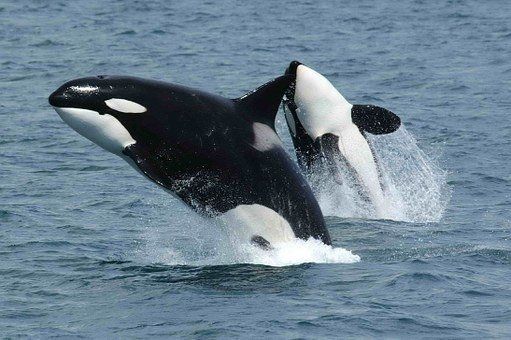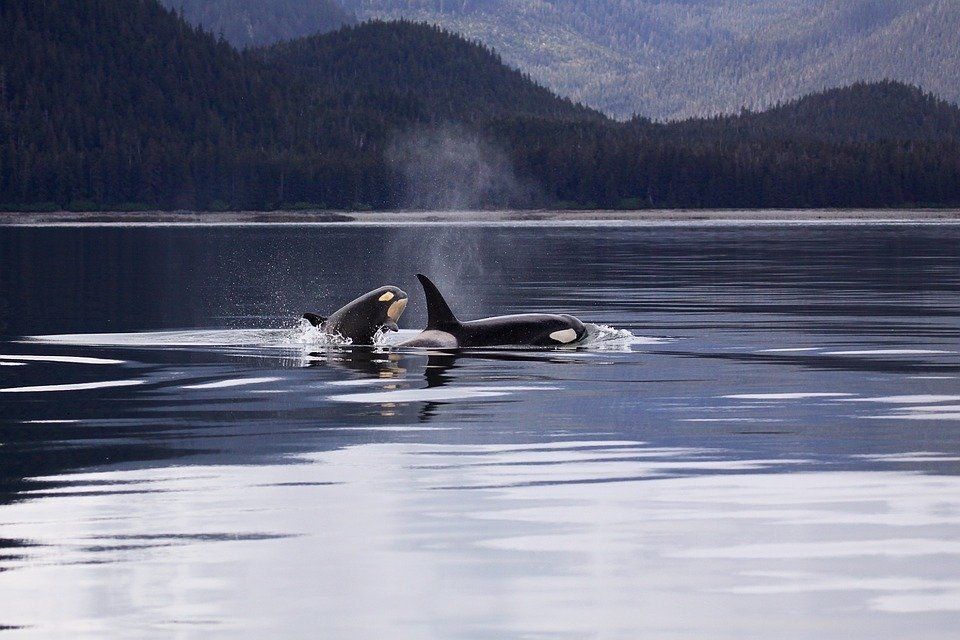Evaluating the Status of the North Atlantic Killer Whale.
The killer whale (Orcinus orca) is one of the most well recognized marine mammals on the planet thanks in part to their popularity in marine parks worldwide. Orcas gained their common name of killer whale due to their highly evolved hunting techniques that allow them to prey on marine animals ranging from fish to whales larger than themselves. They have even been known to hunt great white sharks, making them an apex predator in the marine environment.
A group of researchers recently conducted a review study on 111 scientific publications focusing on the North Atlantic killer whales. The aim of this review was to summarize everything that is known about the killer whale populations that inhabit the waters of the North Atlantic Ocean and to highlight areas of research that are still lacking. In particular, the review focused on the areas of distribution, abundance, movements, genetic structure, acoustics, population parameters, and threats.
The killer whales of the Northern Atlantic can be found in the waters of Norway, the Faroe Island, the British Isles, Canada and Greenland. There are occasionally sightings of killer whales in the tropics, but overall the abundance is much higher in the northern latitudes. The highest abundance of killer whales is believed to be in the North-eastern Altantic. Many of these populations are well studied, but there is a general lack of knowledge about the populations off the coasts of Greenland and Eastern Canada.
It has been proposed by many people in the scientific community that speciation may be occurring. This means that instead of one species, killer whales may actually be breaking up into different species or subspecies. This idea is supported by behavioral, dietary, genetic, and morphological diversity that occurs among different populations of killer whales. Research on genetic variation has further supported this idea in the Northern Atlantic, with at least three differentiated populations identified. Research done on tooth wear and nitrogen stable isotopes also supports the idea of speciation. It identified a minimum of two killer whale ecotypes in the North Atlantic: one that preys on herring and mackerel, and one that preys on baleen whales. More research on genetics needs to be done in this area to make any solid conclusions, and more photo-identification population studies need to be conducted to determine if these populations overlap.
There are many threats to killer whales and they come in a variety of different forms. Historically, killer whales in the North Atlantic have been threatened by live capture for marine parks and death for being a nuisance to the fisheries industry. While many of these threats are now a thing of the past, killer whales still face threats due to chemical pollution, climate change, and acoustic disturbance.
Chemical pollution is a big problem for marine life, and animals at the top of the food chain, like the killer whale, tend to get the worst of it. Blubber samples taken from the killer whales have indicated very high concentrations of chemicals like PCBs and DDT. The whales in the North Atlantic with the heaviest level of contamination were those found in Gibraltar, the Canary Islands, the UK, and Ireland. Many individuals sampled had chemical concentrations well above thresholds that cause physiological, reproductive, and immune problems for the whales.
Climate change is another threat to killer whales. Due to the warming oceans, they face the threat of shifting prey distribution. As their preferred prey items continue to change their distribution and drop off in abundance, the whales will be forced to make changes to their diets or face starvation. Low prey abundance will ultimately lead to poor body condition if the whales are unable to readjust. Luckily, killer whales have been known to show a level of plasticity when it comes to prey, which indicates that they will be able to adapt.
Overall, the authors of this review were able to conclude that our knowledge of the North Atlantic killer whale has increased greatly, but we still need to know more in order to better protect these magnificent animals. They identified chemical pollution as the greatest threat to the North Atlantic killer whales due to the fact that their toxicity levels are too high. While the animals may be able to live with the level of toxicity, it does hinder their ability to reproduce and could lead to population decline. They also found that there needs to be more research done to determine various populations and subpopulations specifically through the use of photoidentification and genetic work. It was also mentioned that there is an overall lack of research that has been done on the populations of Greenland and Eastern Canada. The more we know about these animals, the better we will be able to help them thrive and recover in their own natural environment.
References:
Jourdain, E., Ugarte, F., Víkingsson, G.A., Samarra, F.I.P., Ferguson, S.H., Lawson, J., Vongraven, D., Desportes, G. 2019. North Atlantic killer whale Orcinus orca populations: a review of current knowledge and threats to conservation. Mammal Review.
Rigney, E. 2019. Orcas eat great white sharks-new insights into rare behavior revealed. National Geographic. Web: https://www.nationalgeographic.com/animals/2019/07/killer-whales-orcas-eat-great-white-sharks/
SHARE THIS ARTICLE















